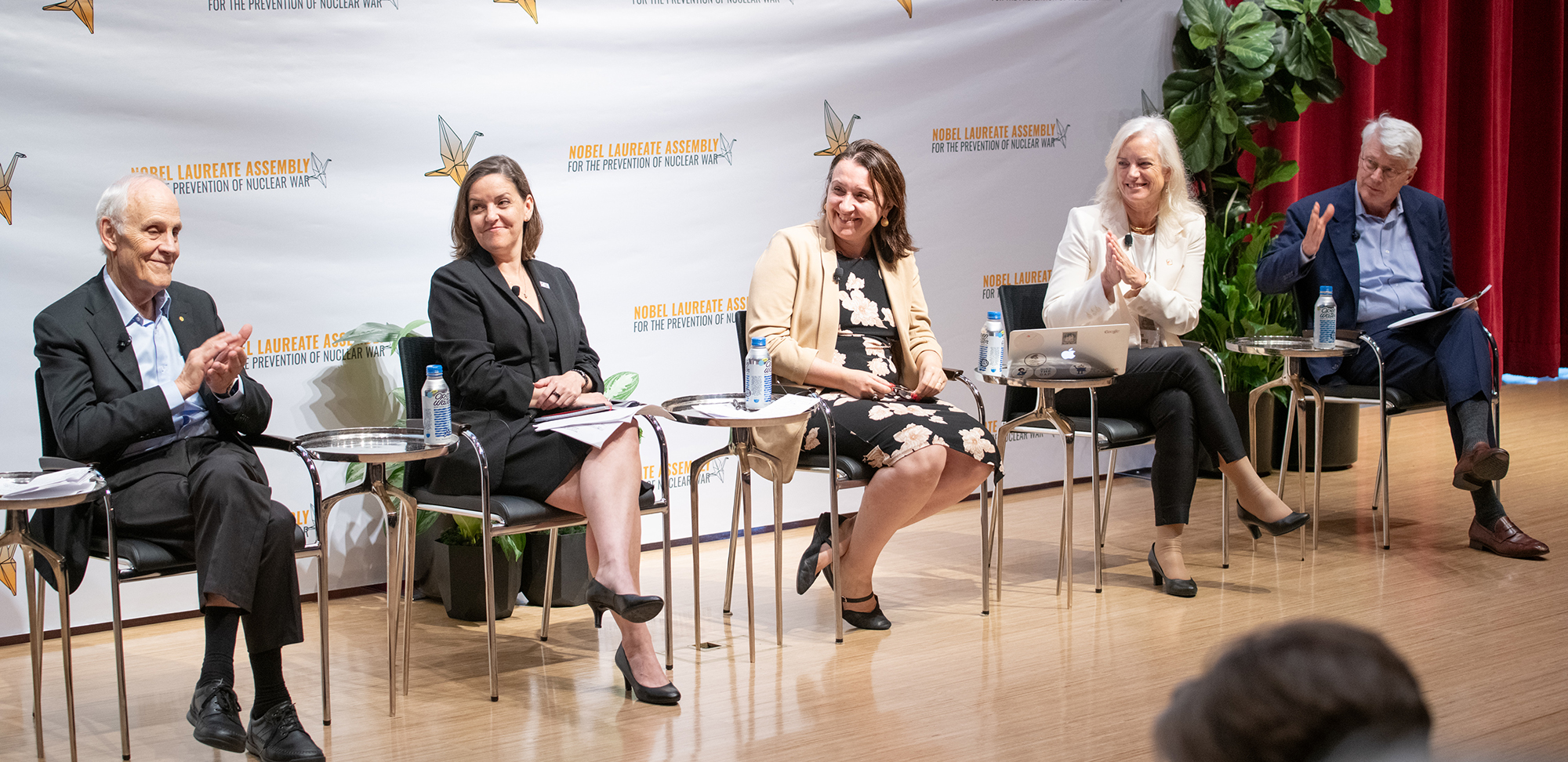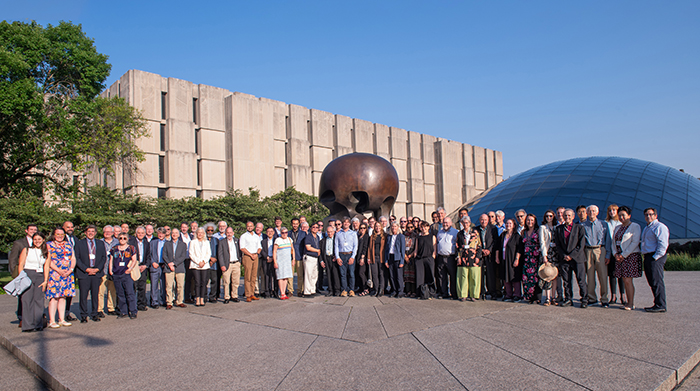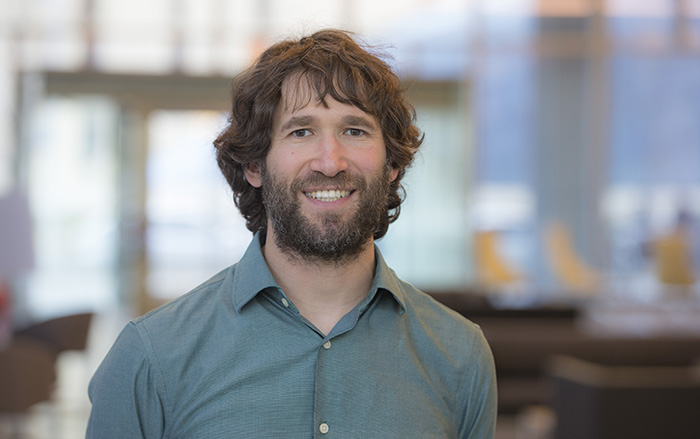
From left: David Gross, Alexandra Bell, Francesca Giovannini, Karen Hallberg, and Brian Schmidt at the Nobel Laureate Assembly for the Prevention of Nuclear War. (Photography by John Zich)
Nobel laureates and nuclear experts urge action on a looming threat.
On July 16, 1945, the United States detonated the world’s first atomic bomb at a remote air force base in New Mexico. Eighty years after that event, called the Trinity test, Nobel laureates, security experts, and thinkers from around the world came together at the University of Chicago to call for an end to the era of nuclear weapons and warfare.
“You have nothing to lose and life itself to gain,” said David Gross, a 2004 Nobelist in physics and one of the organizers of the Nobel Laureate Assembly for the Prevention of Nuclear War.
The July 16 public gathering capped two-and-a-half days of behind-the-scenes learning, discussing, and writing by the assembly’s 80 or so attendees. The group, which included some 20 Nobel laureates, had arrived in Chicago with hopes of drafting a declaration that would make concrete proposals for the prevention of nuclear war—and they did, just under the wire.
“We easily could have ended up with no declaration, no consensus. And until the very end, it was unclear,” says assembly co-organizer Daniel Holz, SM’94, PhD’98. But through thoughtful discussion, the group arrived at a document with nine recommendations its diverse membership could stand behind (see excerpt below). Since the release of the declaration, 129 Nobel laureates, including five with UChicago affiliations, have signed it.
Holz, a UChicago professor of physics and astronomy and astrophysics, is not new to thinking about the possibility of global destruction. As chair of the science and security board of the Bulletin of the Atomic Scientists, he is responsible for helping set the Doomsday Clock, a symbolic measurement of how close humanity is to self-annihilation. Holz also founded UChicago’s Existential Risk Laboratory, a research group dedicated to studying threats to humanity’s long-term survival—including nuclear war.
Holz found equally concerned compatriots in his fellow physicists Gross and Brian Schmidt. Both Gross and Schmidt, a 2011 Nobel laureate, had come to believe that public awareness of the nuclear threat has waned to the point of complacency. Together the trio began work on planning the assembly, which they hoped would bring renewed attention to the issue. The University of Chicago, with its deep connections to the Manhattan Project, felt like a fitting site for the gathering.
The assembly continued a long tradition of Nobelists working together to address global threats. Over the years, the Lindau Nobel Laureate Meetings, held (in part) on Germany’s Mainau Island, have served as the backdrop for those efforts. The 1955 Mainau Declaration against the use of nuclear weapons was followed by a 2015 Mainau Declaration focused on the dangers of climate change. In 2024 Gross helped initiate a new antinuclear Mainau Declaration but knew he still wanted to do more.
The UChicago event began with a somber reminder of the topic’s grave stakes. Masako Wada, a survivor of the Nagasaki bombing in 1945, sent a video message from Japan. She argued that deterrence, which relies on fear and threat, is not sufficient to save humanity. “We the Hibakusha”—the people affected by the bombings of Hiroshima and Nagasaki—“will tell ... our stories,” Wada said. “We will also urge domestic and international policymakers to take the leadership in working toward a human society free of nuclear weapons and war.”
Robert Floyd, executive secretary of the Comprehensive Nuclear Test Ban Treaty Organization, gave the afternoon’s keynote address. After offering a capsule history of nuclear tests and treaties, he arrived at an assessment of the present moment: “The threat of nuclear disaster is back, back in a way I hoped that I never again would have seen in my lifetime.” Important treaties are expiring, world leaders have threatened the use of nuclear weapons, and global stability is low. To move back from the brink, he argued, countries must focus on rebuilding trust and reducing conflict and uncertainty.
How to do that? A panel discussion following Floyd’s remarks outlined some of the key recommendations in the declaration that aim to shore up that needed trust and stability. Alexandra Bell, president and CEO of the Bulletin of the Atomic Scientists, spoke of the urgent need to improve US-Russia relations—and especially for the two countries to negotiate a successor agreement to the 2011 New START Treaty, which limits US and Russian nuclear forces. The treaty is set to expire this winter.
Francesca Giovannini, executive director of the Project on Managing the Atom at the Harvard Kennedy School, reminded the audience that “in a time of crisis, when everything is sliding, just stopping the slide is good enough.” For that reason, she explained, the declaration calls on states to reiterate their commitment to a moratorium on nuclear explosive testing and to ratify the Comprehensive Nuclear Test Ban Treaty.
But all of this, said physicist Karen Hallberg, the secretary general of the Pugwash Conferences on Science and World Affairs, requires popular support. That’s why, Hallberg noted, the declaration includes a recommendation for “‘scientists, academics, civil society, and communities of faith to help create the necessary pressure on global leaders to implement nuclear risk reduction measures.’” After all, as Gross reminded the audience, “our recommendations are great, but without the political will behind them, nothing will happen.”
Cardinal Silvano Maria Tomasi, who has been active in the Catholic Church’s nuclear nonproliferation efforts and spoke earlier in the day, saw in the assembly and the Trinity test anniversary not just an occasion for fear and sadness but also a chance for renewal. “The Trinity explosion taught us what we are capable of destroying,” he said. “The task before us now is to rediscover what we are capable of preserving and building.”

On the precipice
An excerpt from the Nobel Laureate Assembly Declaration for the Prevention of Nuclear War. Read the full declaration and its list of recommendations.
In this 80th year of the nuclear age, the world finds itself at a reckoning point. Distrust and discord mark the international discourse, and the volume of challenges facing the global community is overwhelming. But there is only one challenge that could end civilization in an afternoon.
In 1955 and 2024, Nobel Laureates gathered at Mainau to issue warnings to the world about the existential threat posed by nuclear war. Tremendous progress has been made in reducing global nuclear stockpiles and nuclear risks, but we are now heading in the wrong direction. Poised at the beginning of a new, complex, and dangerous nuclear arms race, Nobel Laureates and nuclear weapons policy experts must now speak together.
We do not deny that the fear of nuclear war has played a role in preserving some stability among nations, but a global security structure forever dependent on fear is ultimately a reckless gamble. Despite having avoided nuclear catastrophes in the past, time and the law of probability are not on our side. Without clear and sustained efforts from world leaders to prevent nuclear war, there can be no doubt that our luck will finally run out. …
There is no greater obligation than to prevent the catastrophe of nuclear war. … We ask that [global leaders] each be guided by the words of Nobel Laureates Bertrand Russell and Albert Einstein: “We appeal as human beings to human beings: remember your humanity, and forget the rest.”

A world worth saving
A Q&A with assembly co-organizer Daniel Holz, SM’94, PhD’98, a professor of physics and astronomy and astrophysics at UChicago. This interview has been edited and condensed.
What do you think is powerful about having Nobel laureates, in particular, involved in an event like this, even if they aren’t nuclear experts?
For decades there have been groups worried about nuclear risk and what can be done, which is great—there’s a lot of expertise and understanding—but that community can be a little bit insular. Sometimes it’s good to get an outside perspective and new ideas. A Nobel laureate is not going to be afraid to say to a nuclear expert, “I don’t understand what you’re saying” or “This doesn’t make sense, and here’s why.” That added a certain dimension to the conversation.
Nobel laureates also have respect in the global community. The voices of laureates still matter, and I think they capture a lot of the best of humanity through their accomplishments in literature or peace or physics or chemistry. We have about 120 laureates who have signed the declaration now, and when you have 120 laureates agreeing that these things must be done, I think that sends a strong message—at least, that’s our hope.
We have to make these recommendations happen, and the laureates are working with us to help get the word out—both to the public and to the people who make the decisions.
What do you hope will happen a year from now with the declaration?
Well, hopefully we’re all still around a year from now. That would be Step One.
The declaration has many different suggestions. Some are short-term—like, we should study the climatic effects of nuclear war. That’s something we’re already working on, and I hope very much that work continues and accelerates.
One of our recommendations is that nations should not resume nuclear testing. We’ve had a moratorium on testing that has worked very well, and that should continue. Non-action does not sound like a big win, but in the current climate, if we can resist the temptation to slide back into testing, that would be a win.
One of the most important recommendations—and this is one of the more nebulous ones, but it’s absolutely critical—is that there needs to be dialogue between the United States, Russia, and China. One thing all nations agree on is that we don’t want a nuclear war. We just need to find a way for leaders to have discussions about this topic. There are ways to do that, and we learned how during the Cold War.
I hope a year from now at least some of these things will have been done, and if the declaration helps in any small way, it will have been a great success. Because I do think this is one of the most important issues facing civilization in the history of civilization. The threat is real, it’s right in front of us, and even though we don’t want to think about it, it’s still there. It’s a much more dramatic threat than anything else: An hour from now, civilization could be toast.
Sometimes when I think about this stuff, I just want to go eat ice cream.
I’ve eaten a lot of ice cream over the last years. That’s a totally reasonable response. Just don’t go into an ice cream coma and do nothing. Eat the ice cream, and then do something. It’s important to do both.
I don’t want to terrify people and reduce them to a fetal position on the sofa, unable to move. That doesn’t help anyone. This stuff is alarming. We should be terrified and freaked out. But also, there’s plenty we can do, and it really is in all of our interests to do these things. It’s not an insoluble Gordian knot. There are lots of commonsense measures that reduce risk, and the lesson from the Cold War is that it can be done.
The risk of nuclear war is a risk we can address. Otherwise we wouldn’t bother—and there’s no way the laureates would be spending their time on this if it was hopeless.
What, for you, was the most meaningful moment of the assembly?
The event ended with a concert by the Kronos Quartet and Allison Russell, and the final piece included readings by different conference participants about nuclear close calls. After two-and-a-half days of really intense discussion about this topic, it does start to become somewhat abstract. And these readings about moments when civilization teetered in the balance, with strings playing, were so powerful. It captured the insanity of what we’re talking about, but also the beauty of humanity and civilization. This is what we’re trying to preserve.
